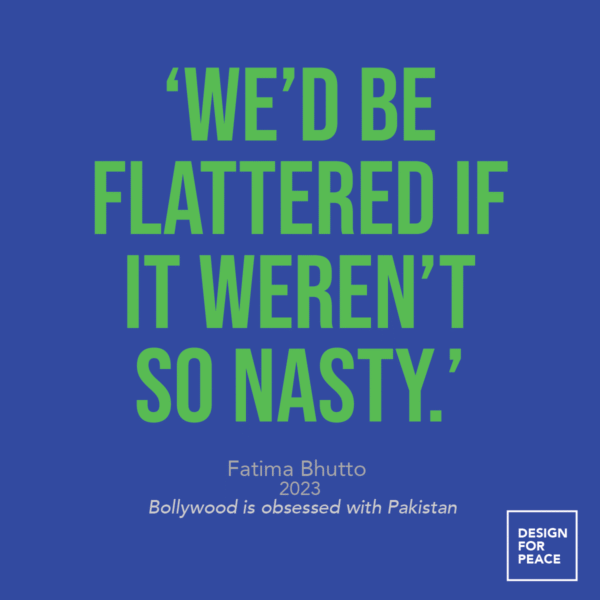Further to me last post, this isn’t just a Hollywood problem.
Bollywood, one of the most prolific film industries on the planet, has its own cinematic patterns, and Pakistan is often cast in a familiar role: the enemy across the border, the stereotypical villain.
As author Fatima Bhutto once observed in The Guardian, ‘We’d be flattered if it weren’t so nasty’, referring to the relentless focus Bollywood places on Pakistan, portrayed as the aggressor, the terrorist haven, the lurking threat to Indian sovereignty. It’s a narrative repeated so often it becomes reflexive, familiar and unquestioned.
Bollywood films are often cloaked in patriotic fervour, glorifying military action while stripping complex geopolitical tensions into digestible, black-and-white binaries. This obsession is far from harmless. No, it is NOT ‘just a film’. It filters into public opinion and fuels cultural hostility, specially in a region already burdened by political volatility, such films add friction rather than bridge divides.
What’s missing again is nuance: the shared histories, the human costs, the moments of empathy that get edited out in favour of gunfire and nationalism.
Bollywood’s portrayal of Pakistan is not about external threats, it is part of a larger ideological project unfolding within India itself. Under Prime Minister Narendra Modi’s leadership, the rise of Hindu nationalism has reshaped not just policy, but storytelling. From school textbooks to newsrooms to blockbuster cinema, a singular vision of ‘New India’ is being aggressively asserted, one that sidelines minorities and elevates Hindutva ideals. Author and activist
Arundhati Roy [I love this woman] warns against this shift, ‘India is veering toward a dangerous majoritarianism, where dissent is equated with treason and diversity is recast as division.’
Cinema has become one of the most effective tools in this process. Films like The Kashmir Files or Tanhaji are marketed as historical or patriotic, but often blur the line between art and ideological agenda. They validate majoritarian anxieties, romanticise warfare, and frame Hindu identity as both victimised and victorious.
This isn’t just narrative, it’s nation-building. And it’s happening in real time.
In today’s cinematic landscape, the phrase ‘based on true events’ has become a powerful, and a very dangerous, marketing tool. It lends films a veneer of authority, implying fact, justice, and legitimacy. But truth is never one-dimensional. And whose version of events gets to be immortalised on screen matters deeply.
Take Hotel Mumbai or Uri: The Surgical Strike. These films aren’t just dramatic retellings of terror and retribution, they are emotionally charged reinforcements of nationalistic sentiment. Pakistan is cast, again, as the shadowy aggressor. The audience is offered no space for doubt. No alternative context. No reflection on state accountability.
And, sadly, the pattern continues. After the recent tragic Pahalgam attack, Indian officials were quick to point fingers at Pakistan, without permitting any third-party, independent international investigation. Within days, rumours emerged that a film is already in development. Before the mourning is over, the narrative is being scripted, not just for courtrooms or diplomacy, but for cinema halls.
The screen becomes the final word. Not evidence. Not nuance. Not justice.
If films shape how we see the world, and they do, then filmmakers are not just artists. They are architects of memory. Of empathy. Of fear. Of belonging. And with that comes an enormous ethical responsibility.
Stories will always be political. But peace-oriented storytelling dares to complicate the narrative rather than flatten it.
This is not to say cinema should be sterile or soft. But it must be conscious. Especially in times of war, polarisation, and media saturation, we must ask:
Who is telling the story? Whose voice is missing? And who benefits from the version we are watching?
As audiences, we carry that responsibility; to think critically, to seek out silenced perspectives, to challenge the comfortable myths we are offered.
Because peace rarely begin at the negotiation table, it begins with us, when we question and challenge the popular narrative and choose to see from a varied lens.


Leave a Reply
You must be logged in to post a comment.